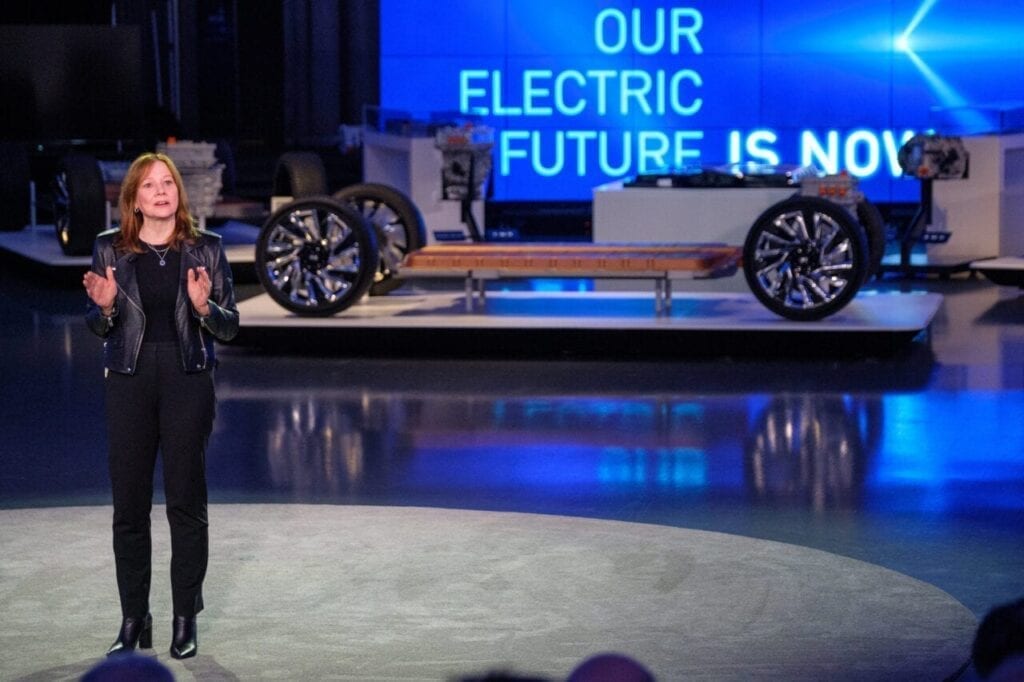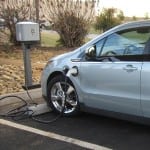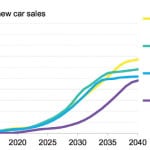The electrification of the transportation sector has received a boost as General Motors (GM) said it “aspires” to exclusively offer electric vehicles (EVs) by 2035, ending production of its cars, trucks, and sport utility vehicles (SUVs) with diesel- and gasoline-powered engines.
The company has said it wants to be carbon neutral by 2040 across its global product offerings and operations. As part of the Jan. 28 announcement, the company said it plans to use 100% renewable energy to power its U.S. facilities by 2030, and to run its global facilities by 2035.
GM’s announcement Thursday comes one day after President Joe Biden signed several executive orders prioritizing climate change initiatives across the new administration and federal agencies. The Detroit, Michigan-based automaker for several years has promoted what it has called a “triple zero vision,” a program that includes EVs to reduce pollution—what it called “zero emissions”—from the transportation sector. The plan also talked about advanced safety vehicle technologies and self-driving vehicles, to achieve “zero congestion and zero crashes.”
“For General Motors, our most significant carbon impact comes from tailpipe emissions of the vehicles that we sell—in our case, it’s 75 percent,” GM CEO Mary Barra said in a statement. “That is why it is so important that we accelerate toward a future in which every vehicle we sell is a zero-emissions vehicle.

“General Motors is joining governments and companies around the globe working to establish a safer, greener and better world,” Barra said. “We encourage others to follow suit.”
The company in a news release said it is working with EVgo, a developer of fast-charging systems, to triple the size of the nation’s largest public fast-charging network by adding more than 2,700 new fast chargers by the end of 2025. The lack of charging infrastructure has long been cited as another reason car buyers have been reluctant to purchase EVs. GM said the chargers will be powered by 100% renewable energy.
Purchasing Carbon Credits
GM’s announcement Thursday stopped short of saying all its vehicles will be zero emissions. Its carbon-neutral goal means that GM would buy carbon credits to offset any vehicles and manufacturing plants that are not zero emissions.
“‘Aspire’ is a great word because it helps us work toward our vision,” said Dane Parker, GM’s chief sustainability officer, in a media briefing. “We’re taking action to have our vehicles be zero emissions by 2035. This is going to take the effort of a lot of people and a lot of governments to get there. So, we have a vision, we have a plan, and we’re taking action today to get there.”
Analysts have estimated that EVs, including battery-powered and fuel cell-powered vehicles, make up less than 5% of global automotive sales. The cost of EVs has been a factor, as such vehicles have been costlier to manufacture than those with fossil fuel-powered engines. The automotive industry, though, has moved to increase research and development of EVs due to regulations on carbon emissions, and as automakers join the global effort to reduce the impacts of climate change.
The power generation sector has closely watched the evolution of the EV market as it ponders the impact on the power grid. Some analysts and industry experts have wondered whether the grid is ready for increased demand from the EV sector.
A survey provided to POWER from West Monroe, a national technology consulting firm, “found that 59% of respondents would likely purchase an electric vehicle for their next car,” and more than half of those said that purchase would be made in the coming year.
“The announcements by GM and the Biden administration represent a watershed moment for U.S. economic opportunity and market transformation,” said Andrew Dillon, an Innovation Fellow in the energy and utilities practice at West Monroe, in an email to POWER. “As other nations like China race to be the new world leaders in electric transportation, aiming to leapfrog other established nations, the announcement by GM to switch to fully electric vehicle production by 2025 shows the U.S. is stepping fully into the game. Now backed by government policy, a new landscape of transformation is emerging before our eyes, involving cohesive strategy from automakers, electric utilities, government as well as vehicle buyers nationwide.”
Paul DeCotis, a senior director in the energy and utilities practice at West Monroe, told POWER on Thursday, “Recent announcements by automakers to transition to all electric vehicle production are consistent with actions necessary to achieve the decarbonization goals of the Paris Accords, in which the U.S. is set to rejoin. The announcements by GM, VW and others move the needle significantly toward a cleaner energy economy with the support and weight of heavy hitters, including the federal government. The U.S. can emerge as a world leader in clean transportation technology and serve as an exporter of such technology to the rest of the world. The climate benefits, job creation potential, and environmental stewardship are examples of innovation and exceptionalism.”
Company Expects EVs Will be Profitable
Parker in the media call said GM expects it will be profitable as it moves from combustion engine vehicles to EVs.
“We feel this is going to be the successful business model of the future,” said Parker. “We know there are hurdles, we know there are technology challenges, but we’re confident that with the resources we have and the expertise we have that we’ll overcome those challenges and this will be a business model that we will be able to thrive in the future.”
GM previously had said it would transition at least three of its U.S. manufacturing facilities to produce EVs; Parker also said the company’s other plants are “excited” about the transition.
“We feel like this transition is one that will protect all of our futures and will help us create a future that will benefit not only the planet, but the people,” he said. The company has announced plans to offer at least 30 new EVs to be sold globally by 2025, part of a $27 billion investment in EVs and self-driving vehicles over the next five years. GM earlier had said it expects that most, if not all, of its Cadillac model cars and SUVs sold worldwide would be electric-powered by 2030.
Parker said, “By 2040, 100% of our portfolio will be fully electric and that’s the vision we’re setting out.” He said GM also signed the Business Ambition Pledge for 1.5-degree Celsius, which is a call by a global coalition of United Nation agencies, business, and industry leaders to protect the environment.
Said Parker: “This is the time for this technology; this is the time for this change.” He said lower prices for EVs, driven by technology advancements, will support the transition. “The convergence of those things has made this an inflection point that we want to seize,” he said.
Importance of Carbon Performance
Stuart McGhie, finance director at Smarter Grid Solutions, a software company focused on distributed energy resource management systems, told POWER in an email, “In the coming year, we expect to see even more businesses set carbon-neutral goals, with carbon performance becoming as important for some companies as profit and loss [P&L] performance.”
McGhie noted that, “Despite the constraining effects of COVID, there has been a step up in investment in green tech and clean energy assets. More widely, we saw a lot of consolidation and investment into smart, flexible energy in 2020 whether in battery storage, EV charging, market platforms, demand response aggregation, the ‘home energy’ domain or microgrid consortia. This showcases the value in flexible distributed energy and we expect for this uptake to continue in 2021.”
GM in a news release said the company worked with the Environmental Defense Fund (EDF) “to develop a shared vision of an all-electric future and an aspiration to eliminate tailpipe emissions from new light-duty vehicles by 2035. GM’s focus will be offering zero-emissions vehicles across a range of price points and working with all stakeholders, including EDF, to build out the necessary charging infrastructure and promote consumer acceptance while maintaining high quality jobs, which will all be needed to meet these ambitious goals.”
“With this extraordinary step forward, GM is making it crystal clear that taking action to eliminate pollution from all new light-duty vehicles by 2035 is an essential element of any automaker’s business plan,” said Fred Krupp, EDF president. “EDF and GM have had some important differences in the past, but this is a new day in America—one where serious collaboration to achieve transportation electrification, science-based climate progress and equitably shared economic opportunity can move our nation forward.”
—Darrell Proctor is associate editor for POWER (@POWERmagazine).









